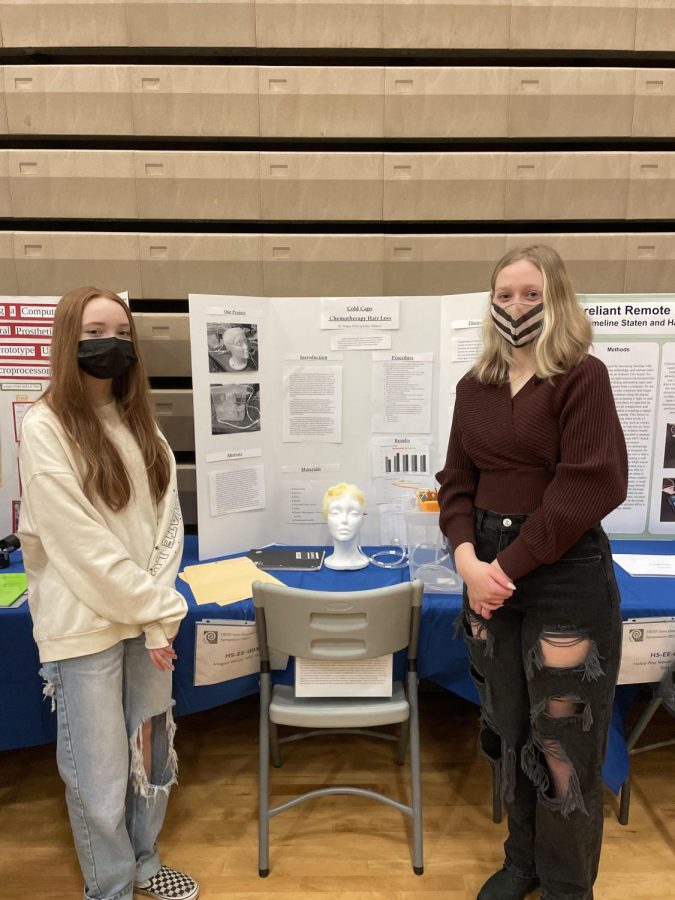Cold Caps and screen protectors
February 1, 2023
Photo provided by Mia Williams
Megan Whitt and Mia Williams stand in front of their science fair display, ready to present! The science fair is a great place for students to share their ideas and inventions.
Inventions are fun hobbies driven by students’ passions to create something– which could maybe change the world. A few students at Wilsonville HS were interviewed on their past projects.
Last year, as freshmen, current sophomores Megan Whitt and Mia Willams invented a Cold Cap. Mia explained that their device was “a cost-efficient Cold Cap for people who experience hair loss.”
Their inspiration to prevent hair loss after chemotherapy was, as Whitt put it, “hair loss is something that can affect somebody quite a bit.” In the past, the two had “studied the effects of ice and its benefits on the brain.”
Whitt described that Cold Caps are an existing technology, and the device “shoots cold liquid through the cap to keep the hair cool.” However, their cost ranges from $4,000 to $10,000 on the market. “For somebody who goes through chemotherapy on its own that’s expensive, especially with people who don’t have health care,” she said.
Whitt and Williams imagined an effective Cold Cap which costs less than $60, and set out to invent one.
Their prototype involved a fishbowl system, some ice water, and a tubing system. Williams explained that the fishbowl system was used to “run the water through a tubing.” They used “silicone to form a cap” and switched out the different fabrics to test which worked the best. The ice water would “run through a little tubing system connected to the silicone cap.”
One may ask, how do Cold Caps work to reduce hair loss? Whitt explained that the cold “makes the blood vessels in the skin of the head narrower,” which reduces the amount of chemo which reaches hair follicles. Both Whitt and Williams believe strongly that losing one’s hair is losing “a part of one’s identity.”
To Whitt, combatting effects of cancer and chemotherapy were also based on her family members’ experiences as “cancer patients,” and they had “experienced hair loss.” She’s done “quite a bit of research on the effects of hair loss on people.” In the future, she wants to continue into the medical field, because she’s “really passionate about womens’ health care.” She aims to enter the fields of gynecology and obstetrics.
Williams is “interested in the psychological range of people, especially severe cases,” and is considering entering the field of psychology in the future.
Last year, another project tackled the question of improving health, but from a different perspective.
Juniors Paul Liu and Kate Kurata worked on inventing a “red light therapy screen protector” last year. The screen protector “improves eyesight overtime,” said Liu.
He explained that many existing screen protectors “decrease the damage from blue light” by filtering it. However, their invention– a screen protector– “reduced all the blue and white lights, which are the lights which damage eyesight,” and “added red light. Most of the blue and white light were eliminated, and 80% of red light went through.”
Their final prototype “didn’t produce results as high” as they wanted, but it “achieved most of [their] goal: The red light definitely increased overall in the blue light and white light decreased.”
Liu would like to enter the field of aerospace engineering in the future, in part inspired by his engineering experiences on this project. Kurata plans to study neurology or chemistry, getting a masters or a PhD in the subject.
